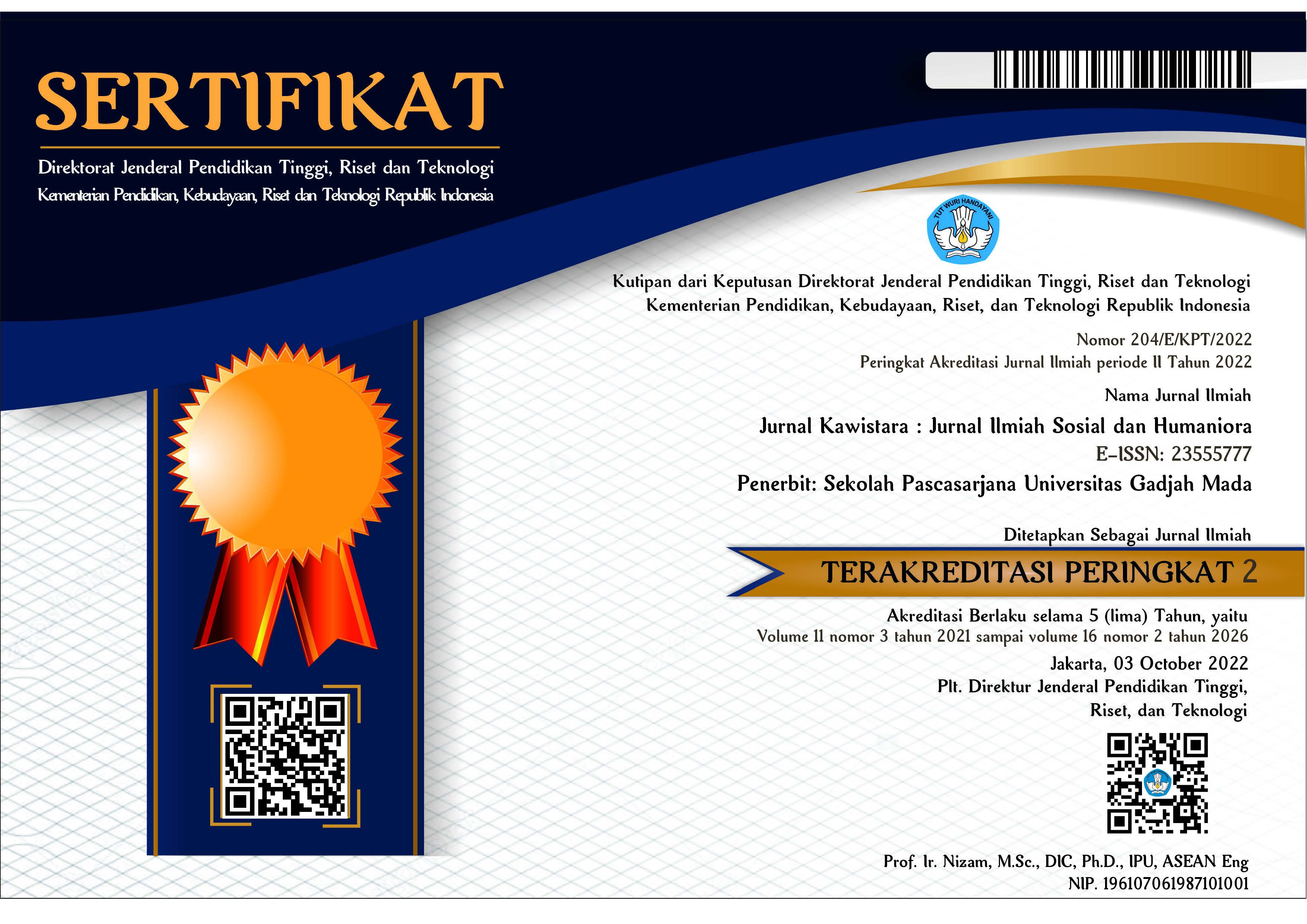A STUDY OF SOLO’S TOURISM PRODUCT POTENTIAL AS HALAL TOURISM DESTINATION IN INDONESIA
Amad Saeroji(1*), Deria Adi Wijaya(2), Isnaini Wijaya Wardani(3)
(1) Faculty of Cultural Sciences, Universitas Sebelas Maret Surakarta
(2) Faculty of Cultural Sciences, Universitas Sebelas Maret Surakarta
(3) Faculty of Cultural Sciences, Universitas Sebelas Maret Surakarta
(*) Corresponding Author
Abstract
Solo or administratively called as Surakarta is a cultural heritage city of the Mataram Kingdom. Tourism of the city shows its development in terms of tourism variety, attractiveness, and amenity. One of the developments leads to halal tourism potentials. The aims of the study are 1) to identify the halal tourism potentials concerning on 4A approach (attraction, amenity, accessibility, and ancillary) as major components of tourism; 2) to examine the opportunities of halal tourism destination to meet the criteria set by GMTI (Global Muslim Travel Index). This study uses a qualitative method. Data were collected through interview, observation, literature review and documentation. The identification of halal tourism products leads to substantive object as basic for reviewing tourism development opportunities. The collected data was analyzed into four 4A variables based on Miles and Hubberman analysis to be presented descriptively. The results showed that halal tourism potentials based on carrying capacity of tourism products is high. The existence of attractions, amenity, accessibility and tourism institution throughout city and the surrounding areas become an important element in the development of halal tourism. As a halal tourism destination, Solo has significant opportunities, especially the availability of amenity in the form of sharia hotels, restaurants and community-based cultural attraction that has grown in line with growth of world’s halal tourism. The accessibility and ancillary variables are still being homework for halal tourism stakeholders to meet the standards set by GMTI. The variables that make Solo feasible for halal destination are in attraction and amenity while accessibility and institutional sector still requires serious handling if referring to the needs of Muslim tourists.
Keywords
Full Text:
PDFReferences
Andriani, Dini et.al. 2015. Laporan Awal Kajian Pengembangan Wisata Syariah. Jakarta: Kemenpar.
BPS Kota Surakarta. 2016. Surakarta dalam Angka 2016. Surakarta: Central Bureau of Statistics of Surakarta.
Cooper, C. 1995. Tourism: Principles and Practices. London: Longman.
Crescentrating. 2016. Mastercard and Crescentrating - Global Muslim Travel Index 2016. Accessed on 10 September 2018 from https://newsroom.mastercard.com/asia-pacific/files/2016/03/Report-MasterCard-CrescentRating-Global-Muslim-Travel-Index-2016.pdf
Din, K. 1989. “Islam and Tourism: Patterns, Issues, and Options”. Annals of Tourism Research, 16(4), 542-563. DOI: http://dx.doi.org/10.1016/0160-7383(89)90008-X.
Indonesian Ulama Council (MUI). 2017. What is the definition of the MUI Halal Certification, the Objectives and the Conditions. Accesed on 10 October 2018 from: http://www.seputarhalal.com/apa-pengertian-sertifikasi-halal-mui-tujuan-dan-syaratnya/.
Jaelani, A. 2017. Halal Tourism Industry in Indonesia: Potential and Prospects. Cirebon: Faculty of Sharia and Islamic Economic, IAIN Syekh Nurjati, MPRA Paper No. 76237.
Miles and Huberman.1992. Analisis Data Kualitatif. (penerjemah: Tjetjep Rohendi Rohidi). Jakarta: UI press.
Ministry of Tourism Republic of Indonesia. 2015. Laporan Akhir Kajian Pengembangan Wisata Syariah. Jakarta: Assistant Deputy for Research and Development of Tourism Policy, Deputy for Tourism Institution Development.
Nirwandar, S. 2016. Road to Halal Tourism and Halal Lifestyle. The paper of International Conference on Halal Tourism (ICHT 2016) in Bandung Institute of Technology, 1 September 2016.
Law of Republic of Indonesia Number 33 Year 2014 concerning on Halal Product Certification.
Pendit, Nyoman S. 2003. Ilmu Pariwisata Sebuah Pengantar Perdana. Jakarta: Pradnya Paramita.
Pitana, I Gede and Diarta, I Ketut Surya. 2009. Pengantar Ilmu Pariwisata. Yogyakarta: Penerbit Andi.
Sofyan, R. 2012. Prospek Bisnis Wisata Syariah. Jakarta: Republika.
Surakarta Tourism Office. 2018. Data Interview with staff of Surakarta Tourism Office in Developing Halal Tourism in Surakarta 2018.
Timothy, D.J.and Olsen, H. 2006. Tourism, Religion and Spiritual Journeys. Oxford: Rutledge.
UNWTO. 2011. Religious Tourism in Asia and the Pacific. Accessed on 4 December 2017. from: http://publications.unwto.org/:http://publications.unwto.org/sites/all/files/pdf/110325_religious_tourism_excerpt.pdf
Wuryasti, F. 2013. Wisata Halal, Konsep Baru Kegiatan Wisata di Indonesia. Accessed on 5 December 2017 from: http://travel.detik.com/read/2013/10/30/152010/2399509/1382/wisata-halal-konsep-baru-kegiatan-wisata-di-indonesia.
Yoeti, Oka A. 1996. Pengantar Ilmu Pariwisata. Bandung: Angkasa.
Zamani, F.H and Anderson, J.C. 2009. Islamic Tourism and Managing Tourism Development in Islamic Societies: The Cases of Iran and Saudi Arabia. International Journal of Tourism Research 12 (1).
Article Metrics
Refbacks
- There are currently no refbacks.
Copyright (c) 2019 Amad Saeroji

This work is licensed under a Creative Commons Attribution-ShareAlike 4.0 International License.
Jurnal Kawistara is published by the Graduate School, Universitas Gadjah Mada.







